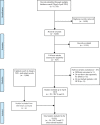Preoperative breast magnetic resonance imaging in patients with ductal carcinoma in situ: a systematic review for the European Commission Initiative on Breast Cancer (ECIBC)
- PMID: 34052881
- PMCID: PMC8270803
- DOI: 10.1007/s00330-021-07873-2
Preoperative breast magnetic resonance imaging in patients with ductal carcinoma in situ: a systematic review for the European Commission Initiative on Breast Cancer (ECIBC)
Erratum in
-
Correction to: Preoperative breast magnetic resonance imaging in patients with ductal carcinoma in situ: a systematic review for the European Commission Initiative on Breast Cancer (ECIBC).Eur Radiol. 2022 Jun;32(6):4333. doi: 10.1007/s00330-021-08489-2. Eur Radiol. 2022. PMID: 34994847 Free PMC article. No abstract available.
Abstract
Objective: To evaluate the impact of preoperative MRI in the management of Ductal carcinoma in situ (DCIS).
Methods: We searched the PubMed, EMBASE and Cochrane Library databases to identify randomised clinical trials (RCTs) or cohort studies assessing the impact of preoperative breast MRI in surgical outcomes, treatment change or loco-regional recurrence. We provided pooled estimates for odds ratios (OR), relative risks (RR) and proportions and assessed the certainty of the evidence using the GRADE approach.
Results: We included 3 RCTs and 23 observational cohorts, corresponding to 20,415 patients. For initial breast-conserving surgery (BCS), the RCTs showed that MRI may result in little to no difference (RR 0.95, 95% CI 0.90 to 1.00) (low certainty); observational studies showed that MRI may have no difference in the odds of re-operation after BCS (OR 0.96; 95% CI 0.36 to 2.61) (low certainty); and uncertain evidence from RCTs suggests little to no difference with respect to total mastectomy rate (RR 0.91; 95% CI 0.65 to 1.27) (very low certainty). We also found that MRI may change the initial treatment plans in 17% (95% CI 12 to 24%) of cases, but with little to no effect on locoregional recurrence (aHR = 1.18; 95% CI 0.79 to 1.76) (very low certainty).
Conclusion: We found evidence of low to very low certainty which may suggest there is no improvement of surgical outcomes with pre-operative MRI assessment of women with DCIS lesions. There is a need for large rigorously conducted RCTs to evaluate the role of preoperative MRI in this population.
Key points: • Evidence of low to very low certainty may suggest there is no improvement in surgical outcomes with pre-operative MRI. • There is a need for large rigorously conducted RCTs evaluating the role of preoperative MRI to improve treatment planning for DCIS.
Keywords: Breast cancer; Ductal carcinoma in situ; Magnetic resonance imaging.
© 2021. The Author(s).
Conflict of interest statement
Elena Parmelli and Zuleika Saz-Parkinson are current employees of the Joint Research Centre, European Commission. Carlos Canelo-Aybar, Pablo Alonso-Coello, and David Rigau are employees of the Iberoamerican Cochrane Collaboration. Axel Gräwingholt, Annette Lebeau, Elsa Pérez Gómez and Miranda Langendam are members of the ECIBC Guidelines Development Group. Paolo Giorgi Rossi, as principal investigator of an independent study, funded by the Italian Ministry of Health, conducted negotiations with Hologic to obtain reagents at reduced price or for free; the reagents have not been used by Paolo Giorgi Rossi’s institutions; he is also member of the ECIBC Guidelines Development Group. Jessica Hanae Zafra-Tanaka and Alvaro Taype-Rondan were employees of the Institute for Health Technology Assessment and Research (IETSI) from the Peruvian Social Security at the time the study took place.
Figures




References
-
- Ferlay J, Ervik M, Lam F et al (2018) Global Cancer Observatory: cancer today. Lyon, France: International Agency for Research on Cancer. Available from: https://gco.iarc.fr/today. Accessed 25 07 2019
-
- Schmale I, Liu S, Rayhanabad J, Russell CA, Sener SF. Ductal carcinoma in situ (DCIS) of the breast: perspectives on biology and controversies in current management. J Surg Oncol. 2012;105:212–220. - PubMed
Publication types
MeSH terms
LinkOut - more resources
Full Text Sources
Other Literature Sources
Medical

